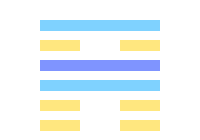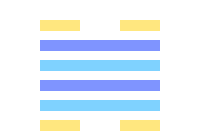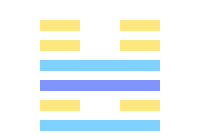56.4 (56 > 52)

56.4 (56 > 52) - THE LÜ HEXAGRAM.
The fourth line, undivided, shows the traveller in a resting-place, having (also) the means of livelihood and the axe, (but still saying), ‘I am not at ease I in my mind.’
Bing DeepL Google Yandex56.4 (56 > 52) - Losing legitimacy
When one defends oneself from others, one sees that things are not going well.
Bing DeepL Google Yandex56.4 (56 > 52) - Losing legitimacy
When one defends oneself from others, one sees that things are not going well.
Bing DeepL Google Yandex56.4 (56 > 52) - Lu, le voyageur
Lu : voyageur, hôte, étranger, loger ; bon arrangement.
Il peut s’être établi quelque part, y avoir ses biens et sa hache, mais son cœur n’est point encore à l’aise et en sûreté. (Il n’a point une situation assurée, il doit veiller.)
Bing DeepL Google Yandex56.4 (56 > 52) - Perdre sa légitimité
En se défendant des autres, on voit que ça ne va pas.
Bing DeepL Google YandexThe trigrams
The trigrams are combinations of three yin and yang lines. The three bottom lines of the hexagram form the lower trigram and represent the inner situation. The three top lines form the upper trigram and represent the outer situation.
Upper trigram: The fire The mountain


Lower trigram: The mountain

The formation: 56
What is already there

56 - THE LÜ HEXAGRAM.
Lü intimates that (in the condition which it denotes) there may be some little attainment and progress. If the stranger or traveller be firm and correct as he ought to be, there will be good fortune.
Bing DeepL Google Yandex56 - Lu, le voyageur
Lu : voyageur, hôte, étranger, loger ; bon arrangement.
Lu « bon arrangement ». Avec un faible commencement, le bon arrangement conduit au succès, à la consolidation, au bonheur.
Texte
L’étranger ambulant prospère difficilement. S’il est juste et droit, il aura une heureuse fortune.
Symbolisme
Le feu au-dessus d’une montagne. Ainsi le grand et sage fait briller sa droiture en appliquant les lois pénales et ne laisse pas durer les différends et les procès.
Commentaire
Si le faible acquiert, maintient sa droiture chez les étrangers et reste soumis au fort, il sera stable et attaché à la claire vérité. Ainsi l’étranger nomade, faible au commencement, prospérera et s’affermira s’il est droit et juste.

56.4 (56 > 52) - THE LÜ HEXAGRAM.
The fourth line, undivided, shows the traveller in a resting-place, having (also) the means of livelihood and the axe, (but still saying), ‘I am not at ease I in my mind.’
Bing DeepL Google Yandex56.4 (56 > 52) - Losing legitimacy
When one defends oneself from others, one sees that things are not going well.
Bing DeepL Google Yandex56.4 (56 > 52) - Losing legitimacy
When one defends oneself from others, one sees that things are not going well.
Bing DeepL Google Yandex56.4 (56 > 52) - Lu, le voyageur
Lu : voyageur, hôte, étranger, loger ; bon arrangement.
Il peut s’être établi quelque part, y avoir ses biens et sa hache, mais son cœur n’est point encore à l’aise et en sûreté. (Il n’a point une situation assurée, il doit veiller.)
Bing DeepL Google Yandex56.4 (56 > 52) - Perdre sa légitimité
En se défendant des autres, on voit que ça ne va pas.
Bing DeepL Google YandexIn the making: 52
What is poised to happen

52 - THE KĂN HEXAGRAM.
When one's resting is like that of the back, and he loses all consciousness of self; when he walks in his courtyard, and does not see any (of the persons) in it, there will be no error.
Bing DeepL Google Yandex52 - Stop
One recognizes that it is time to stop because one needs to feed oneself.
Bing DeepL Google Yandex52 - Stop
One recognizes that it is time to stop because one needs to feed oneself.
Bing DeepL Google Yandex52 - Kán, l’arrêt
Kán : ferme, tenir droit, bien réglé, arrêter, reposer
Kan « ferme ». L’homme ferme tourne le dos et s’oppose résolument, sans tenir compte de lui-même. S’il traverse un endroit, il ne regarde pas qui y est et ne faillit point.
Texte
L’homme ferme s’oppose résolument (au mal) sans tenir compte de lui-même. Devant traverser un endroit, il ne regarde pas qui s’y trouve (mais le fait résolument) et ne faillit point.
Symbolisme
Deux montagnes superposées forment le Koua. Ainsi l’homme supérieur pense à ne pas dépasser les bornes de ses fonctions.
Commentaire
Kán signifie s’arrêter, tenir ferme, en bon ordre, agir ou s’arrêter selon l’occasion. Quand l’acte et sa cessation ont lieu en temps convenable, la conduite est belle et intelligente. « Rester à sa place », cela veut dire que les grands et les petits sont en rapport, mais sans usurpation ni entre-croisement. Celui qui est ferme et attentif à son devoir ne se recherche pas lui-même. Marchant dans son jardin, il ne voit pas même qui s’y trouve.
Note. Tout ceci illustre le sens « tenir droit, bien réglé » et se réfère aux rites du maintien extérieur qui prescrivent de se tenir toujours droit et de ne pas même s’asseoir sur un siège qui n’est pas droit.
52 - Cesser
On reconnaît qu'il est temps de s'arrêter car on a besoin de s'alimenter.
Bing DeepL Google Yandex52 - Megállás
Felismeri hogy itt az ideje megállni mert a többieket táplálni kell.
Bing DeepL Google YandexThe nuclear hexagram: 28.3.5 (28 > 40)
The nuclear hexagram is the association of the two inner trigrams (lines 2,3,4 and 3,4,5). It represents the root, or the origin of the situation.

28.3.5 (28 > 40) - THE TÂ KWO HEXAGRAM.
- 3. The third line, undivided, shows a beam that is weak. There will be evil.
- 5. The fifth line, undivided, shows a decayed willow producing flowers, or an old wife in possession of her young husband. There will be occasion neither for blame nor for praise.
28.3.5 (28 > 40) - Making a flop
One becomes the target of mockery when others learn that one has been disappointing.
Bing DeepL Google Yandex28.3.5 (28 > 40) - Making a flop
One becomes the target of mockery when others learn that one has been disappointing.
Bing DeepL Google Yandex28.3.5 (28 > 40) - Tá kvoh, le grand excès
Tá kvoh : 1. Grand excès, défaut, manquement ; 2. Traverser, dépasser.
- 3. Une poutre, un pilier trop faible (voir texte I) sont mauvais (ils ne peuvent supporter) (grand défaut).
- 5. Un vieux saule produisant une fleur, une vieille femme épousant un homme encore jeune, quoique non blâmables, ne peuvent être loués. La fleur du vieux saule ne peut durer, l’époux d’une vieille femme peut s’en dégoûter. (Faits qui passent les règles ordinaires.)
28.3.5 (28 > 40) - Faire un flop
On devient la cible de moqueries quand les autres apprennent qu'on a été décevant.
Bing DeepL Google Yandex28.3.5 (28 > 40) - Lemondás
- 3. Ápolja kapcsolatait.
- 5. Igyekszik javítani mielőtt mások észrevennék a hanyatlást.
The reciprocal: 55.3
The hexagram upside down. It represents the opposite situation, and as such is insturmental when validating comments.

55.3 (55 > 51) - THE FĂNG HEXAGRAM.
The third line, undivided, shows its subject with an (additional) screen of a large and thick banner, through which at midday he can see (the small) Mei star. (In the darkness) he breaks his right arm ; but there will be no error.
Bing DeepL Google Yandex55.3 (55 > 51) - Yielding to pressure
The weakest abstain because they don't want to bear any more.
Bing DeepL Google Yandex55.3 (55 > 51) - Yielding to pressure
The weakest abstain because they don't want to bear any more.
Bing DeepL Google Yandex55.3 (55 > 51) - Fâng, l’abondance
Fâng : 1. Abondance, richesse, grand nombre d’amis ; 2. Avoir en abondance, multiplier ; 3. Grandeur, élévation.
En multipliant ses tentures, on peut (grâce à l’obscurité) voir l’étoile Mei (au Sagittaire) en plein jour, mais alors on se cassera le bras droit (il arrivera malheur).
Bing DeepL Google Yandex55.3 (55 > 51) - Céder sous la pression
Les plus faibles s'abstiennent car ils ne veulent pas en supporter davantage.
Bing DeepL Google Yandex55.3 (55 > 51) - Kezelni
A leggyengébb tartózkodik, mert nem akar többet vállalni.
Bing DeepL Google Yandex
